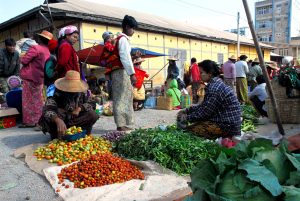
Vendors selling fruits and vegetables at a market in Kalaw, Myanmar.
Credit: Depositphotos
Myanmar is due for a second successive year of economic contraction, as global financial turbulence converges with the political and economic turmoil triggered by the February 2021 coup d’état, according to a prominent risk assessment agency.
In its latest Myanmar outlook, published yesterday, Fitch Solutions, a division of Fitch Group, projected that the country’s economy would shrink by 5.5 percent in the current financial year, which ends in September.
The negative growth projection reflects the impact of the ongoing post-coup conflict, compounded by the impact of “high global commodity prices and domestic inflation,” Fitch stated in its report.
While this represents an improvement of sorts on the scarcely believable 17.9 percent contraction that Myanmar saw in FY 2020-21, Fitch forecast no immediate end to the country’s economic travails.
“Our forecasts imply that economic conditions will remain extremely challenging in Myanmar in the months ahead,” the report stated. “We do not expect economic output lost during the pandemic to be recouped until at least FY28.”
The projection speaks to the extent of the disarray wrought by the military’s seizure of power in February 2021. In the nearly 18 months since, the security forces have killed close to 2,100 people, according to the Assistance Association for Political Prisoners, which keeps a running total of those killed and detained since the coup. The United Nations refugee agency reported this week that the number of displaced in Myanmar has now topped 1.1 million, of which an estimated 769,400 have been displaced since the coup.
The conflict also shows few signs of ending, with the military junta now facing a determined coalition of adversaries including the National Unity Government (NUG), a sort of internal government-in-exile made up of members of the ousted civilian government and their allies, People’s Defense Forces loosely aligned with the NUG, and ethnic armed groups that have been fighting for autonomy for decades.
The flipside of this political turmoil is near-economic collapse. As Western nations have imposed economic sanctions and international investors have withdrawn from the country, Myanmar has seen a sharp spike in unemployment and a collapse in the value of the kyat currency. Meanwhile, the conflict has destroyed vital infrastructure and impeded daily economic activity in many regions of the country, including in parts of central Myanmar that had previously been mostly free of conflict. The World Bank, which is slated to release its own Myanmar outlook tomorrow, estimated last year’s economic contraction at 18 percent.
Fitch predicted that the unresolved political crisis would continue to weigh heavily on the country’s economic prospects, and vice-versa. “Economic hardship will increase the scope for social discontent, and encourage more people to take up arms against the junta,” it stated. “This will likely lead to more damage to infrastructure and harm the normal functioning of commercial activities, partially mitigating any potential positive growth impulses from a relaxation of COVID-19 restrictions in 2022.”
The group said that it predicted real GDP growth would return to positive growth of 2.5 percent in FY2023, as global commodity prices and inflation begin to ease, “reducing some of the pressure on real household disposable income.” But given the low statistical base, it described this projected recovery as “meager.”
“The growth rates we forecast for 2023 will be wholly insufficient to lead to a meaningful improvement in living conditions and the poverty situation in the country, where around half of the population is living in absolute poverty,” it said.


